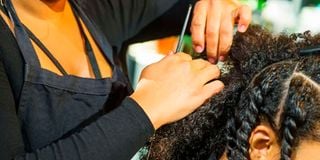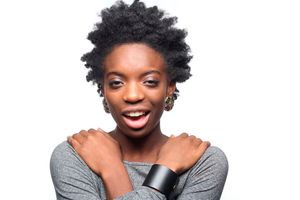Postpartum hair loss: What to expect and why you should not worry

Postpartum hair loss can frustrate many women, but it’s a passing cloud
What you need to know:
As your hormones settle down, the effects of pregnancy-related hormonal changes on your body will gradually decrease, and your hair will return to normal.
Talk to your doctor if you suffer from severe postpartum hair loss or if you have had the symptoms for more than a year.
Many changes occur in a woman’s body during pregnancy and after childbirth. Postpartum hair loss is one of these changes. As with other conditions related to pregnancy, fluctuating hormone levels during pregnancy and after childbirth are usually the triggers of this hair loss.
After childbirth, oestrogen and progesterone levels drop. As hormones return to normal, many mothers will experience significant hair loss within a few months of having a baby.
Here’s the good news:
Such hair loss is a short-term experience and many women get their normal hair back within one year.
How hormones contribute to hair loss
Hormonal imbalance is common after childbirth, and postpartum hair loss is one of the signs of hormonal imbalance. Usually, your hair sheds in small amounts each day.
Postpartum hair loss can start any day after your baby’s arrival and can last for up to a year.
Causes of postpartum hair loss
Pregnancy hormones can affect your body in various ways. You may have noticed that your hair is thicker when you are pregnant. Hormonal changes are responsible for this, making your hair grow faster.
However, after you give birth or when you’ve stopped breastfeeding, you may start losing hair.
Basically, the hair that did not fall out during pregnancy is now falling out. While it may seem like hair loss, it is actually things returning to normal.
How to prevent hair loss after childbirth
Consume Vitamins
Vitamins should not replace a balanced diet, especially for a new mother. Use them as a supplement. It is usually recommended that you continue with your prenatal vitamins, even after delivery.
Talk to your doctor about taking supplements or vitamins to help prevent and boost hair regeneration if you’re concerned about postpartum hair loss.
Skip the styling
Your hair will look thinner if you heat it with a drier or curl it. Avoid fancy hairstyles and opt for air-drying until the thinning stops.
Brushing too hard also causes hair loss, so be gentle while brushing and do not brush multiple times a day.
Change your hair care habits
Adjusting your hair habits can stop or reduce hair loss. For example, use a shampoo that’s specifically formulated for postpartum hair loss to strengthen your hair.
Your hair is easy to break when wet. Gently brush after washing your hair or air-dry it. Steer clear of hot straightening tools or rollers to avoid further damage caused by extreme heat.
Maintain a healthy diet
Good nutrition is essential after childbirth. A healthy diet can assist in overall recovery including keeping your hair strong.
Including fruits, healthy fluids, vegetables, and proteins in your diet ensure your body gets all the essential nutrients.
Reduce Stress
Low-stress levels help control hormonal imbalances.
Try different relaxation techniques such as meditation, mindfulness, or breathing exercises. This can help reduce stress. Speak to close friends, family, or a professional if you feel outraged, anxious, or depressed.
Keep it natural
Keep your hair as natural as possible. Opt for natural hair oils that may help improve hair growth and stop or reduce hair loss.




